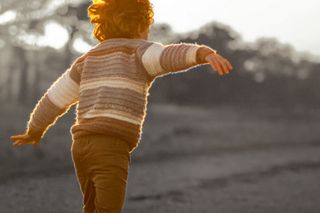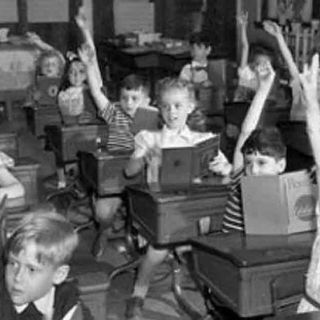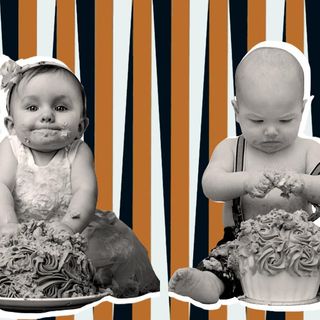
Your Earliest Childhood Memories May Not Be Real
It’s not inception, it’s just the way the brain develops.

When I was one and a half, I chugged half a bottle of cinnamon.
Actually, I attempted to chug it. What actually happened was I just managed to thickly coat my tongue and the inside of my cheeks in very fine and incredibly spicy dust. I have a clear memory of the moment when all semblance of moisture was sapped away, leaving my mouth like a desert on an exceptionally hot day, and me choking, tearful and shocked as to why I wasn’t tasting a delightful apple pie flavor. (At that point, I only knew cinnamon from my mother mixing it into my applesauce, a concoction I loved — hence the chugging.) I remember sitting in the corner of our dining room, chairs towering above me, unable to speak or cry. I just clasped the box in silent, arid and righteous indignation, until my mother turned around a moment later and saw what I’d done.
Except, I probably don’t remember that. Any of it. Oh, it definitely happened (I just checked with my mother last night to be sure), but at one and a half, I would have been far too young to encode it as a lasting memory.
Up until around age 7, children can remember events and episodes that occurred at very young ages, sometimes before age 1. But around 7, something called ‘childhood amnesia‘ kicks in, leaving adults with earliest memories that, at most, date back to age 3 to 3 and a half.
I decided to very scientifically test this with some of my coworkers. One remembers the spray nozzle on her Princess Jasmine perfume not working, so she decided to watch it to make sure the perfume came out — only to spray it into her eyes. Her age? Probably around 3, she says. Another remembers impressing her father by reciting a whole prayer from memory — also around 3.
We forget much of our earlier experiences because we’re still building all of the complex neural processes that go into forming a memory: “You have to learn to use a calendar and understand the days of the week and the seasons,” explains Patricia Bauer, PhD, a psychologist at Emory University who has studied childhood amnesia. “You need to encode information about the physical location of the event. And you need development of a sense of self, an understanding that your perspective is different from that of someone else.”
Then what of my cinnamon-scented first memory?
“We suggest that what a rememberer has in mind when recalling fictional improbably early memories is an episodic-memory-like mental representation consisting of remembered fragments of early experience and some facts or knowledge about their own infancy/childhood,” says Shazia Akhtar, PhD, a memory researcher at the University of Bradford. “Such episodic-memory-like mental representations come, over time, to be recollectively experienced when they come to mind and so for the individual they quite simply are ‘memories’ which particularly point to infancy.”
Akhtar is the first author of a new study into earliest memories. My biggest takeaway from her research is that I’m not alone: Nearly 40% of people hold a fictional first memory, formed out of half-remembered fragments of environment or emotion, knowledge about their childhood pieced together from family photos and conversations, and retrospective surmising. In my case, my precocious cinnamon double shot is part of family lore; the story was told and retold throughout my childhood, possibly until I unwittingly co-opted it into a memory infused by others’ recall and my own adult personality. (Was I really sitting there in righteous fury, because what I ate didn’t taste the way I expected it to? Probably not — but I do that quite frequently as an adult.)
Akhtar and team did ask their participants to make sure the memory they recounted wasn’t related to a family story or photograph, but memory doesn’t work that way. Study co-author Martin Conway, PhD, the director of the Centre for Memory and Law at City, University of London, said they found many people who claimed to have memories from before age 3 recounted memories related to infancy, for instance, a memory of a pram.
“For this person, this type of memory could have resulted from someone saying something like ‘mother had a large green pram.’ The person then imagines what it would have looked like. Over time these fragments then becomes a memory, and often the person will start to add things in, such as a string of toys along the top,” he says. “Crucially, the person remembering them doesn’t know this is fictional. In fact, when people are told that their memories are false, they often don’t believe it.”
Over the years, the story of my first memory has come to be a kind of capsule explanation of who I am — curious, impetuous, impatient of discomfort, expressive of face, a lover of spicy food. A Twitter thread asking “What’s the most On Brand (TM) story you have from your early childhood” explored this recently, with the prompter, mu, describing a moment of abject defiance:
What’s the most On Brand™️ story you have from your early childhood.
Which means that however false our early memories are, they’re also true, rooting us in who we are and where we came from. Or who we think we are and where we think we came from. But isn’t that the same thing?
Liesl Goecker is The Swaddle's managing editor.
Related


Praising Good Behavior in the Classroom Works Better Than Correcting Disruption
